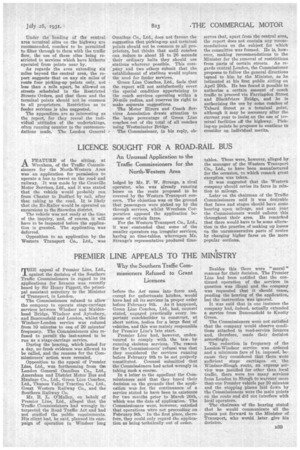PREMIER LINE APPEALS TO THE MINISTRY Why the Southern Traffic
Page 57

If you've noticed an error in this article please click here to report it so we can fix it.
Commissioners Refused to Grant Licences THE appeal of Premier Line, Ltd., against the decision of the Southern Traffic Commissioners in regard to its applications for licences was recently heard by Sir Henry Piggott, the principal assistant secretary to the Minister of Transport, in London.
The Commissioners refused to allow the company to operate stage-carriage services between Windsor and Maidenhead Bridge, Windsor and Aylesbury, and Beaconsfield and London, whilst the Windsor-London service was reduced from 10 minutes to one, of 20 minutes' frequency. The Commissioners also refused to permit the last-named to be run as a stage-carriage service.
During the hearing, which lasted for a day, no fresh evidence was allowed to be called, and the reasons for the Commissioners' action were revealed.
Opposition to the appeal of Premier Line, Ltd., was forthcoming from the London General Omnibus Co., Ltd., Amersham and District Motor Bus and Haulage Co., Ltd., Green Line Coaches, Ltd., Thames Valley Traction Co., Ltd., Great Western Railway Co., and the Southern Railway Co.
Mr. B. L. O'Malley, on behalf of Premier Line, Ltd., alleged that the Traffic Commissioners had wrongly interpreted the Road Traffic Act and had not studied the public requirements. His client had, he said, planned its campaign of operation in Windsor long before the Act came into force and, except for unfortunate hitches, would have had all its services in proper order before February 9th. As it happened, Green Line Coaches, Ltd., had, counsel stated, engaged practically every. Ma, portant coachlmilder to construct, at short notice, bodies for a large fleet of vehicles, and this was mainly responsible for Premier Line's late start.
Premier Line had, however, endeavoured to comply with the law, by running skeleton services. The reason for the Commissioners' refusal was that they considered the services running before February 9th to be not properly constituted. Counsel submitted that the Commissioners had acted wrongly in taking such a course. '
In a letter to the appellant the Commissioners said that they based their decision on the grounds that the application was for the continuance of a • service stated to have been in existence for two months prior to March 26th, e which was the date of application. The Commissioners were, however, satisfied that operations Were not proceeding on February 9th. In the first place, therefore, they could only regard the application as being technically out of order. Besides this there were "moral" reasons for their decision. The Premier Line had been notified that the continued operation of the services in question was illegal and the company was requested that it should cease, pending the hearing of the application, but the instruction was ignored.
It was said that in one instance the company had, indeed, actually extended a service from Beaconsfield to Knotty Green.
The Commissioners were not satisfied that the company would observe conditions attached to road-service licences and, therefore, made their decision accordingly.
The reduction in frequency of the London-Windsor service was ordered and a minimum fare of 1s. imposed, because they considered that there were sufficient stage carriages. on 'the Windsor-Slough route, an express service was justified for other than local traffic, there were too many services from London to Slough to warrant more than one Premier vehicle per. 20 minutes and the stopping places laid down by the Commissioners were the main points on the route and did not interfere with local operators.
The chairman of the hearing stated that he would communicate all the points put forward to the Minister of Transport, who would later give his decision.




































































































